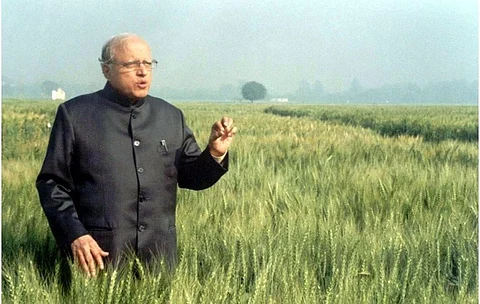

Dr. Mankombu Sambasivan Swaminathan, often referred to as M.S. Swaminathan, the father of India's Green Revolution and renowned Indian agriculture scientist, passed away today, September 28, 2023 at his residence in Chennai, at the age of 98. Swaminathan was awarded the first World Food Prize in 1987 following which he set up the MS Swaminathan Research Foundation (MSSRF) in Chennai. He well knew to all as an eminent Indian scientist and agricultural researcher who has made significant contributions to the field of agriculture and food security.
Dr Swaminathan is survived by his three daughters, Dr Soumya, the chairperson of MSSRF, Dr Madhura, who is an economics professor at the Indian Statistical Institute and Nitya, who was a lecturer in gender analysis and development at the University of East Anglia.
Throughout his life Dr. Swaminathan worked consistently toward a vision of a world in which there were no hungry or poor populations. He also did great work with the concept of sustainable development, especially with eco-friendly techniques of agriculture, food availability, and biodiversity conservation. He has also been praised by many international organizations for spreading the benefits of his research work across geographical boundaries.
The Green Revolution refers to a series of steps and technology transfers to the agriculture sector that caused a great surge of farm productivity. The steps had taken included developing high-yield varieties of grains, using fertilizers and pesticides, developing pest-resistant crops, using hybrid seeds with enhanced genetics, and so on. Although the green revolution was not limited to India and was applied to many developing countries, it was most successful in India.
Green Revolution Pioneer:
M.S. Swaminathan was born on August 7, 1925, in Kumbakonam, Tamil Nadu. He completed his undergraduate studies in zoology and agriculture from the University of Madras. He pursued postgraduate studies at the Indian Agricultural Research Institute (IARI) in New Delhi and later earned a Ph.D. in genetics from the University of Cambridge, UK.
Swaminathan is often referred to as the "Father of the Green Revolution in India." He played a crucial role in introducing high-yielding crop varieties, modern agricultural techniques, and improved farming practices to India during the 1960s. Worldwide, the father of the Green Revolution was American agronomist Norman Borlaug; in India, the honour is bestowed on Swaminathan, for his pioneering role in this field. His efforts helped India achieve self-sufficiency in food production and significantly increased agricultural productivity.
His research primarily focused on wheat and rice breeding, leading to the development of high-yielding crop varieties. He emphasized the importance of integrated pest management, soil health, and sustainable farming practices. His work also extended to advocating for the conservation of agricultural biodiversity and promoting organic farming.
Synonym of Success:
Swaminathan has held many posts in many national & international organizations, including the Director-General of the Indian Council of Agricultural Research (ICAR) and the Secretary in the Department of Agriculture and Cooperation, Government of India. He also advised the Indian government on agriculture-related issues several times. He initiated the concept of trusteeship management of Biosphere reserves. He executed the Gulf of Mannar Biosphere Reserve Trust.
1981 – 85: Independent Chairman of the United Nations Food and Agriculture Organization (FAO).
1984 – 90: President of the International Union for Conservation of Nature and Natural Resources (IUCN).
1988 – 96: President of the World Wide Fund for Nature–India.
2001: Chairman, Regional Steering Committee for the India – Bangladesh joint Project on Biodiversity Management in the Sundarbans World Heritage Site.
Awards & Honours that are Uncounted:
The government constituted the National Commission on Farmers (NCF) in 2004 with Swaminathan as the chairman, in order to address the pressing issue of farmers’ suicides in India.
Dr. Swaminathan has received numerous awards and honors for his contributions to agriculture and food security. These include the Padma Bhushan and the Padma Vibhushan, two of India's highest civilian honors.
He was awarded the World Food Prize in 1987 for his outstanding achievements in increasing global food production.
He received the Shanti Swarup Bhatnagar Award in 1961 for biological sciences. The GOI bestowed the Padma Vibhushan on Swaminathan in 1989.
In 1971, he received the Ramon Magsaysay Award for Community Leadership. He also received the UNESCO Mahatma Gandhi Gold Medal in 1999.
His Legacy will Continue On:
Dr. Swaminathan's legacy extends beyond his scientific work. He has been an advocate for sustainable and equitable agricultural development, focusing on issues such as food security, poverty alleviation, and rural development. He continues to be involved in various initiatives related to sustainable agriculture and environmental conservation. Also has worked on several humanitarian projects, including the "Evergreen Revolution" concept, which aims to promote sustainable agriculture while addressing environmental concerns and improving the livelihoods of farmers. His lifelong dedication to improving agriculture and food security in India and globally has left an indelible mark on the field of agricultural science and continues to inspire future generations of scientists and policymakers.
An ELEGY to Father of Green Revolution:
We never forget that you saved millions of people from starvation,
In fields of knowledge, you sowed the seeds so bright,
M.S. Swaminathan, a beacon of agricultural might.
Green Revolution's champion, your legacy shall remain,
A farmer's friend, alleviating hunger's painful chain.
In reverence we stand, your memory held in highest esteem,
A visionary for all, in the annals of a dream!
